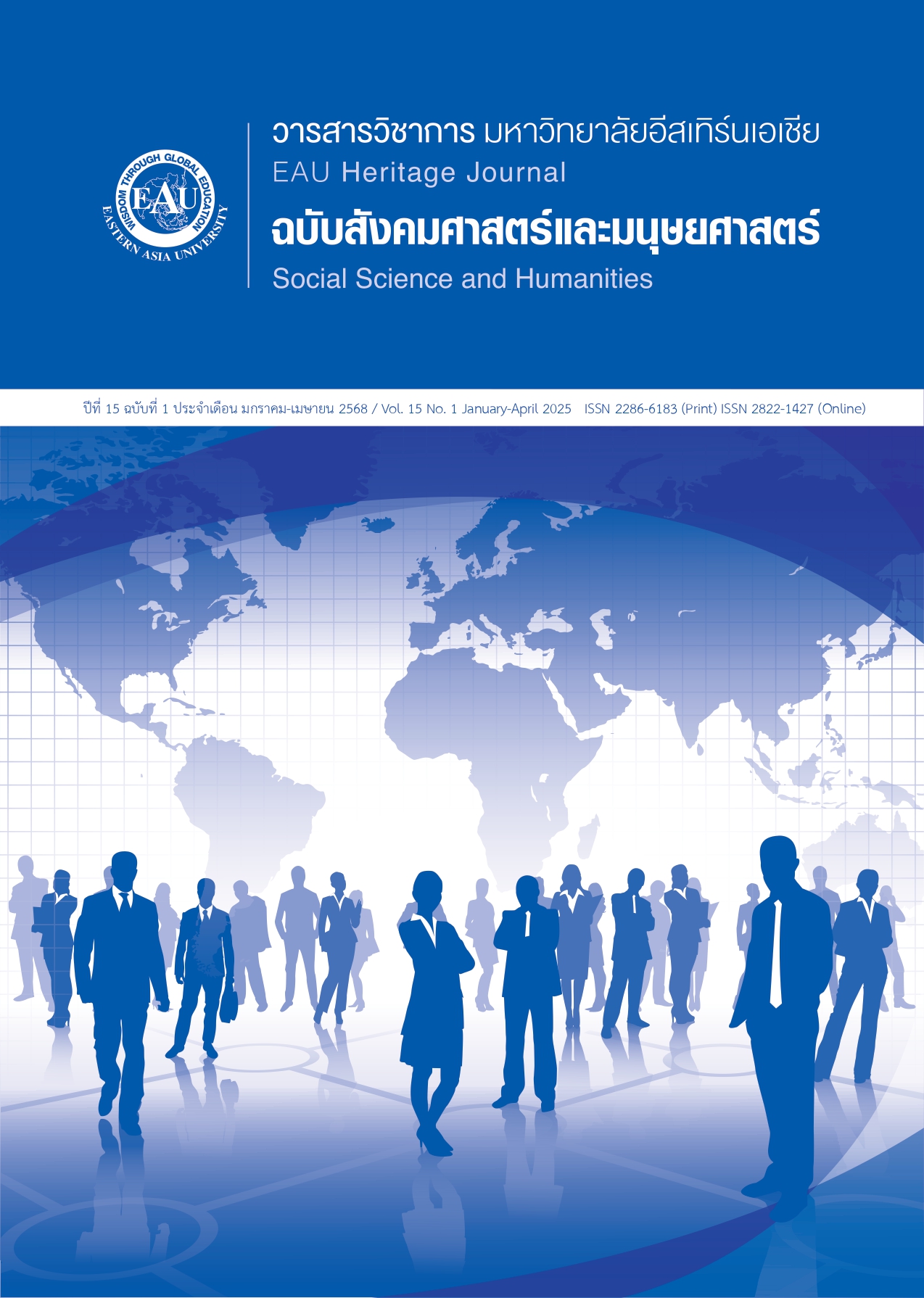Interlanguage Pragmatics of Thai EFL Learners’ Requests
Keywords:
Appropriateness, Interlanguage Pragmatics (ILP), Second Language Acquisition (SLA), Thai EFL LearnersAbstract
This article examines the development of politeness among Thai learners of English as a Foreign Language (EFL), focusing on their ability to make requests in ways that are both culturally appropriate and socially sensitive. Central to this study are two key concepts: interlanguage—the transitional linguistic system used by non-native speakers—and pragmatics, which investigates the intended meanings behind language use. Specifically, the study explores how Thai learners' request-making behaviors are influenced by pragmalinguistics (language-specific strategies) and sociopragmatics (understanding social norms and expectations). While appropriate request-making is crucial across varied social contexts, the evolution of politeness in Thai EFL learners remains underexplored. Drawing on existing research in second language acquisition, the paper delves into the complexities of how learners navigate politeness when making requests. It highlights that achieving pragmatic competence involves more than mastering grammar—it requires the integration of social and cultural knowledge. This supports Bardovi-Harlig’s (1999) assertion that although grammatical competence alone is insufficient for pragmatic appropriateness, it is a necessary foundation. By addressing this gap, the article sheds light on the intersection of language use and social interaction, providing insights that are valuable for both researchers and educators in the field of EFL.
References
Austin, J. L. (1962). How to do things with words. In Jaworski, A., & Coupland, N. (Eds.), The discourse reader (pp. 63-75). New York: Routledge
Bachman, L. F. (1990). Fundamental considerations in language testing. Oxford, New York: Oxford University Press.
Bachman, L., & Palmer, A. (1996). Language testing in practice. Oxford: Oxford University Press
Bardovi-Harlic, K., & Griffin, R. (2005). L2 pragmatic awareness: Evidence from the ESL classroom. System, 33, 401-415. Doi: https://doi.org/10.1016/j.system.2005.06.004
Bou-Franch, P. (2012). Pragmatic transfer the encyclopedia of applied linguistics. Retrieved from https://doi.org/10.1002/9781405198431.wbeal0932 (Major Reference Works)
Blum-Kulka, S. (1989). Playing it safe: The role of conventionality in indirectness. In S. Blum-Kulka, J. House, & G. Kasper (Eds.), Cross-cultural pragmatics: Requests and apologies (pp. 37-70). Norwood, NJ: Ablex.
Brown, P., & Levinson, S. C. (1987). Politeness: Some universal in language usage. Cambridge: Cambridge University Press.
Canale, M., & Swain, M. (1980). Theoretical bases of communicative approaches to second language teaching and testing. Applied linguistics, 7(1), 1-47. Doi: http://dx.doi.org/10.1093/applin/I.1.1
Chantharasombat, J., & Pongpairoj, N. (2018). Interlanguage pragmatics: Deviant patterns of negative responses to English negative yes/no questions by L1 Thai Speakers. International journal of applied linguistics & English literature, 7(3), 193-199. Doi: https://doi.org/10.7575/aiac.ijalel.v.7n.3p.193
Chiravate, B. (2011). Perception of politeness in English requests by Thai EFL learners. The southeast asian journal of English language studies, 17(2), 59-71.
Felix-Brasdefer, J. C. (2007). Pragmatic development in the Spanish as a FL classroom: A cross-sectional study of learner requests. Intercultural pragmatics, 4(2), 253-286. Doi: https://doi.org/10.1515/IP.2007.013
Hymes, D. (1972). On communicative competence. In J. Pride & J. Holmes (Eds.), Sociolinguistics (pp. 269-293). Harmondsworth, England: Penguin Books.
Ishihara, N., & Cohen, A. D. (2010). Teaching and learning pragmatics: Where language and culture
meet. Harlow, England: Longman/Pearson Education.
Kasper, G. (1992). Pragmatic transfer. Second language research, 8(3), 203-231. Doi:
https://doi.org/10.1177/026765839200800303
Kasper, G., & Blum-Kulka, S. (1993). Interlanguage pragmatics: An introduction. In G. Kasper & S. Blum-Kulka (Eds.), Interlanguage pragmatics (pp. 3-18). Oxford University Press.
Koike, D. A. (1989). Pragmatic competence and adults L2 acquisition: Speech acts in interlanguage. The modern language journal, 73, 279-289.
Latif, H. (2024). A pragmalinguistic analysis of request external and internal modification strategies: The case of Moroccan University Students of English. Journal of pragmatics and discourse analysis, 3(2), 64-77. Doi: https://doi.org/10.32996/jpda.2024.3.2.7
Levinson, S. C. (1983). Pragmatics. Cambridge: Cambridge University Press.
Otgontuya, D., Odontuya, L., & Otgontuul, T. (2024). A comparative Study of request strategies in mongolian and English. Library progress international, (3), 19499-19505
Rose, K. R. (2000). An exploratory cross-sectional study of interlanguage pragmatic development. Studies in second language acquisition, 22, 27-67. Doi:
https://doi.org/10.1017/S0272263100001029
Selinker, L. (1972). Interlanguage. International review of applied linguistics in language teaching,
(1-4), 209-232. Doi: https://doi.org/10.1515/iral.1972.10.1-4.209
Taguchi, N. (2012). Context, individual differences and pragmatic competence. Bristol, United
Kingdom: Multilingual Matters.
Taguchi, N. (2017). Interlanguage pragmatics. In A. Barron, P. Grundy, & G. Yueguo (Eds.), The
routledge handbook of pragmatics (pp. 153–167). Oxford New York: Routledge.
Thomas, J. (1983). Cross-cultural pragmatic failure. Applied linguistics 4, 91-112. Doi:
https://doi.org/10.1093/applin/4.2.91
Trosborg, A. (1995). Interlanguage pragmatics: Request, complaints, and apologies. NY: Mouton de Gruyter.





